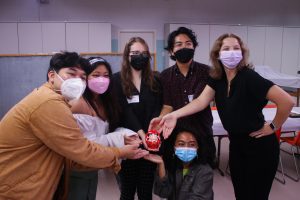JASC Legacy Center Intern Projects
JASC Legacy Center Intern Projects

From June to August 2022, the Legacy Center offered a special internship program for an inaugural cohort of six interns and one community fellow. Over the course of eight weeks, the participants learned about archival research, narrative structure and storytelling, and audiovisual production, developing their skills through a series of hands-on activities. They also had the opportunity to meet scholars and professionals from a variety of fields and engage with members of the Chicago Japanese American community. By the end of the program, each intern produced a short audio or video project touching on themes of wartime incarceration and/or resettlement, and featuring materials from the Legacy Center’s collections.
The program concluded with a public screening event on August 4th, 2022. To view a recording of the event, which includes all six projects and a Q&A session with the interns, please click here. To view the projects individually in their final, complete forms, please see the list below.
JASC is grateful to the National Park Service, U.S. Department of the Interior, for making the 2022 internship program possible through a Japanese American Confinement Sites (JACS) grant. We will not be able to replicate the program in 2023 due to JASC’s planned relocation to a new facility, but hope to offer the program again in the future!
Audio Projects
Multigenerational Voices: How History is Passed From One Generation to the Next
by Savvy Mahr-Threw
For a full transcript, please click here.
This podcast episode focuses on the stories of Tonko and SJ Doi, a grandmother and granddaughter both impacted by Japanese American incarceration during World War II. In this piece, Savvy explores how multigenerational and historical trauma has impacted the passage of their stories, and how Tonko and SJ have become the remarkable people that they are today.
Making Home From Nothing: The Environments of Japanese American Incarceration and Their Legacies
by Brittany Murphy
For a full transcript, please click here.
Making Home From Nothing is a short, 15-minute podcast piece that explores themes of what makes a home a home during forced Japanese American incarceration. Through the lens of the Izui family, this podcast explores the varied complexities of individual lived experiences. The podcast paints immersive scenes through real historical documents from the Izui family’s collections, including letters and newsletters, alongside bureaucratic documents from the War Relocation Authority to explore competing perspectives and depictions.
Listen to brothers Victor Sumio Izui and George Kiyoshi Izui write letters to their uncle about the crummy Idaho weather and the packages of handcrafted items received from their father at Department of Justice camps and imagine the scenes they depict. Despite being torn away from their homes, members of the Izui family bring with them their various personal interests and talents, which they then use to influence the environment around them.
Internment in Okinawa – Episode 1: Photo Album
by Toy Suliman
For a full transcript and supplemental information, please click here.
When it comes to WWII incarceration, most people think about the Japanese Americans who were imprisoned in camps across the U.S., not knowing it also happened on an island across the world. Join host Toy Suliman as she examines the mementos of army veteran, Jerry Jiro Katayama, and discovers an unrecognized side of incarceration history: U.S. military internment camps in Okinawa. In the first episode of what she hopes to turn into a limited series, follow Toy as she deciphers a mysterious photo album and draws together the stories of three different people during WWII.
Video Projects
The Flowers of Missoula
by Arielle Josephine Alibudbud
This short video features the artwork of Mikisaburo Izui, a Japanese immigrant to the United States who was incarcerated during WWII. This video features several items from the Izui Family papers and photographs collection in the archives of the JASC Legacy Center. “The Flowers of Missoula,” explores the intersections of knowledge, environment, and beauty. Through the focus of Izui’s painted rocks, viewers are invited to appreciate his deep botanical knowledge and his ability to find beauty even in the dire environment in which he was forced to live.
Loads of Luck!
by Joshua Reynes
In 1943, Butte High School students of Gila River War Relocation Center published their first yearbook, the Year’s Flight. Follow JASC Legacy Center Summer Intern (and former yearbook staff member at his own high school) Joshua Reynes as he flips through and transports you back into the “All American High School experience” – an ideal further complicated by the FDR administration’s mass incarceration of Japanese Americans. The contents of each page may surprise you.
Lima Bean Manju and the History of Japanese American Food
by Teddy Wu
Join JASC Legacy Center Summer Intern Teddy Wu for this short instructional cooking video for Lima Bean Manju. Through the lens of this sweet treat, he explores the history of Japanese American cuisine, the fusion and friction between two cultures, and food’s role in preserving and proliferating a community’s way of life in the face of postwar resettlement and assimilation.
This material is based upon work assisted by a grant from the U.S. Department of the Interior, National Park Service. Any opinions, findings, and conclusions or recommendations expressed in this material are those of the author(s) and do not necessarily reflect the views of the U.S. Department of the Interior.
This material received Federal financial assistance for the preservation and interpretation of U.S. confinement sites where Japanese Americans were detained during World War II. Under Title VI of the Civil Rights Act of 1964, Section 504 of the Rehabilitation Act of 1973, and the Age Discrimination Act of 1975, as amended, the U.S. Department of the Interior prohibits discrimination on the basis of race, color, national origin, disability or age in its federally funded assisted projects. If you believe you have been discriminated against in any program, activity, or facility as described above, or if you desire further information, please write to:
Office of Equal Opportunity
National Park Service
1849 C Street, NW
Washington, DC 20240
Legacy Center Highlights
Our searchable database of finding aids provides background information and an inventory for each collection.
Use LibraryThing to check our holdings. All are welcome to use our books on-site, and JASC members can check out books if we hold more than one copy.
Engaging, image-rich exhibits to help illuminate the Japanese American experience in Chicago.
Our oral history collection features interviews with community members reflecting on a wide variety of topics from incarceration to contemporary activism.
Check out a documentary film on incarceration and resettlement and a series of four films from 1975 featuring Issei voices.
SUPPORT JASC
Looking for your next great read? Searching for the perfect gift? The JASC Bookshop has titles suitable for children, young adults, and adults on a wide range of topics. Find books about Japanese American history, books by Japanese American authors, books celebrating diversity, books about food and cooking, books about arts and culture, and more!
When you order any title through our shop, your purchase supports both JASC and local, independent bookstores. You get the convenience of online shopping and shipping to your home, with the knowledge that your consumer dollars are making a difference.
Search for a title using the bar below, or visit the shop to browse our lists of carefully selected titles for readers of all ages!

